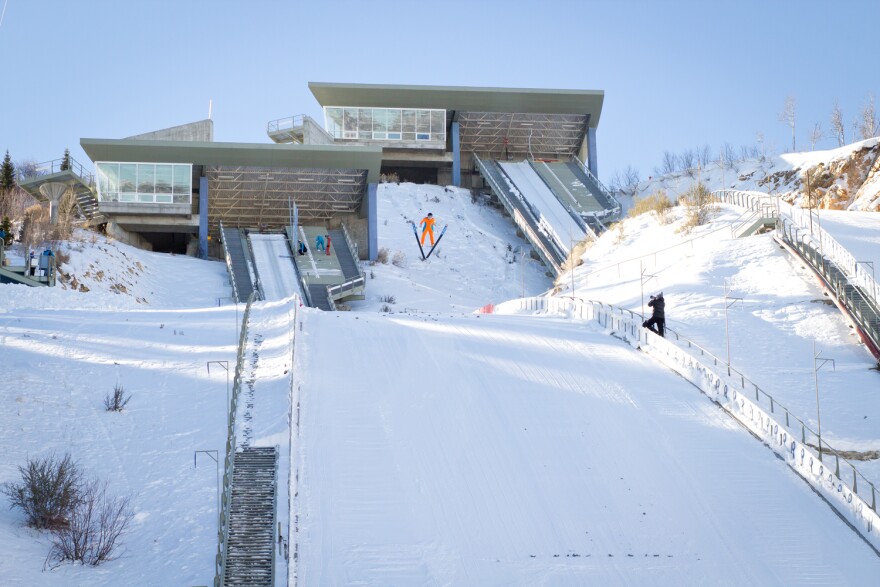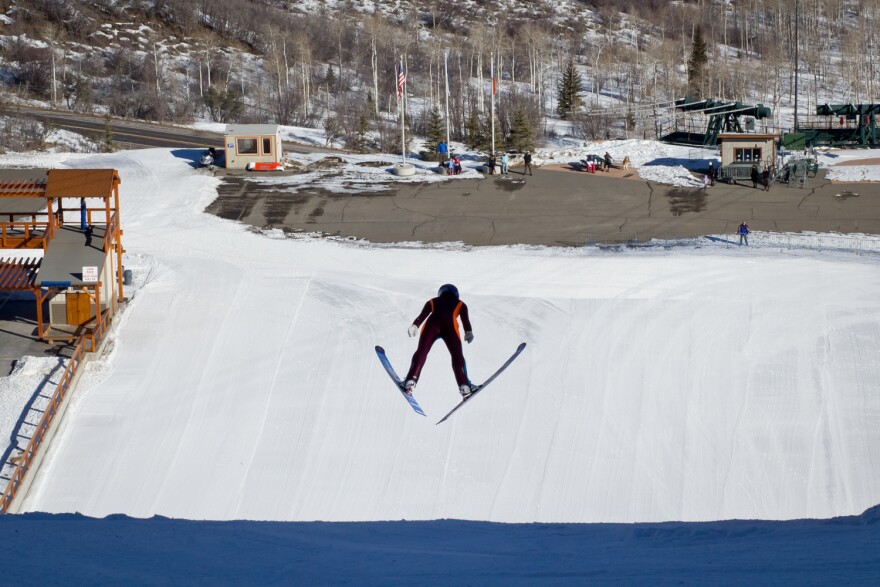In one of their final practices before heading off to SochiJessica Jerome, Lindsey Van, and Sarah Hendrickson take turns launching off of the 90 meter hill at the Utah Olympic Park in Park City. It’s a venue that was built for the 2002 Winter Olympics. For 19-year-old Sarah Hendrickson, those games helped pique her interest in the sport.
“Yeah, it’s pretty cool to say that I’m basically the result of the 2002 Olympics, the legacy that they kept alive," Hendrickson says. "I’m fortunate enough to have those facilities kept in maintenance and at a high level so that I can train everyday right in my backyard.”
For the other two members of this year’s U.S. Women’s Ski Jumping team the 2002 Olympics only served as another reminder of what they were missing. At that time Jerome and Van were already accomplished jumpers. In fact, Jerome was a fore-jumper at those Olympics, testing out the run before the men competed. She says when she first started ski jumping in elementary school she never thought that gender would be such an issue.
“When we did it, for the after school program, there was no gender separation," she says. "It was everybody got together and took jumps together. So, growing up I just trained and jumped alongside the boys and I liked it so I just kept doing it. It didn’t really deter me that there were not women to look up to or that girls weren’t allowed in the Olympics. I thought, ok, well, it will happen and I want to be there when it happens, so I just kept skiing.”
But, by the time she was older it still hadn’t happened. Even with their sport growing the International Olympic Committee continued to deny their request to participate. IOC officials said it was because the sport lacked universality, even though they had more competitors from more countries competing at the highest level than several other women’s Olympic sports.

So in 2008, Jerome joined fellow Women’s U.S. Ski Jumping team member Lindsey Van and 13 other jumpers from around the world in a lawsuit against the Vancouver Organizing Committee. Their goal was to gain access to the 2010 games. The case made it all the way to the British Columbia Supreme Court and in 2009 they declared that the IOC was exhibiting gender discrimination. But the ruling did not force the IOC to hold a women’s event. For Jerome and Van, the ruling was devastating.
“I had a really hard season 2009-2010 winter. Just mentally I was exhausted and my jumping wasn’t good and I was still packing my bags and schlepping over to Europe. And I kind of realized that I wasn’t jumping well. I wasn’t having fun. I wasn’t happy,” Jerome says.
The lowest point came when she went to the Vancouver games as a spectator.
“It was great to cheer on the people that I was there to see, but it was also a total bummer," she says. "It was like the party that I wasn’t invited to and I felt like I was a little bit of a crasher.”
But eventually, their hard work on and off the slopes paid off. In the spring of 2011 the IOC announced that a women’s event would be added to the 2014 Winter Olympics in Sochi, Russia.
“I think it’s something I’ve been mentally picturing for a very long time," she says. "It’s been something that I wanted to do for myself. And the fact that it’s finally happening and I get to be a part of it is very special."
While Hendrickson hasn’t been jumping for as long and wasn’t a part of the lawsuit, she says she’s extremely grateful to her teammates for what they’ve done.
“I’m privileged to be a part of this first generation going to the Olympics and to walk into the opening ceremonies with these two older teammates is a huge honor for me and I can’t thank them enough for what they’ve done for the sport and been able to let me accomplish my dreams of becoming an Olympian,” Hendrickson says.

With their Olympic dreams now realized one question still remains. How well will they do once they get there?
“We’re very fortunate to have three of the strongest in the world," says U.S. Women's ski jumping coach Alan Alborn. "Two of the most experienced I would say and then one, Sarah, who’s been extremely dominant on the circuit. So, their level of confidence flying into Sochi is already higher than 98% of the field. So, I think we have that on our side for sure.”
Alborn says he also feels any of the three women competing could come home with a medal.
“At this point, what I’ve told the athletes is, we and they have done everything possible to get them where they need to be. They just need to get out of their own way right now.”
The biggest wild card going into the games is how reigning world champion Sarah Hendrickson will do after injuring her knee in August. The Olympics will be her first competition since the injury. But Alborn says he doesn’t think it will be an issue.
“She’s blown everyone away with her recovery and every day just exceeding expections," Alborn says. "So, the sky is the limit for her as well. She’s ultra competitive, super motivated. She’s a podium threat for sure.”
But with or without a medal, the three women all agree, they’ve already accomplished more than they could have ever hoped for.
“I hope that our story is inspiring and I hope that people can maybe relate to it, you know, whether it’s in sport or in life, I hope people can relate to it and sort of get inspiration from that,” Jerome says.
Jerome and the other ski jumpers will compete on the international Olympic stage for the first time on February 11.



